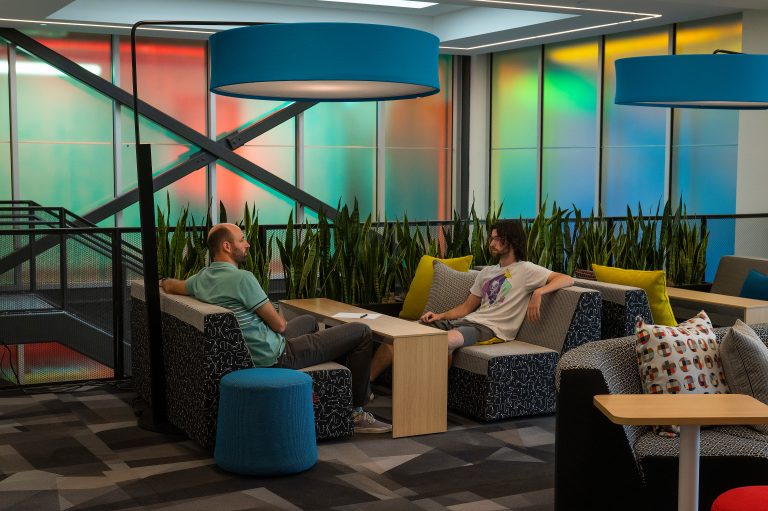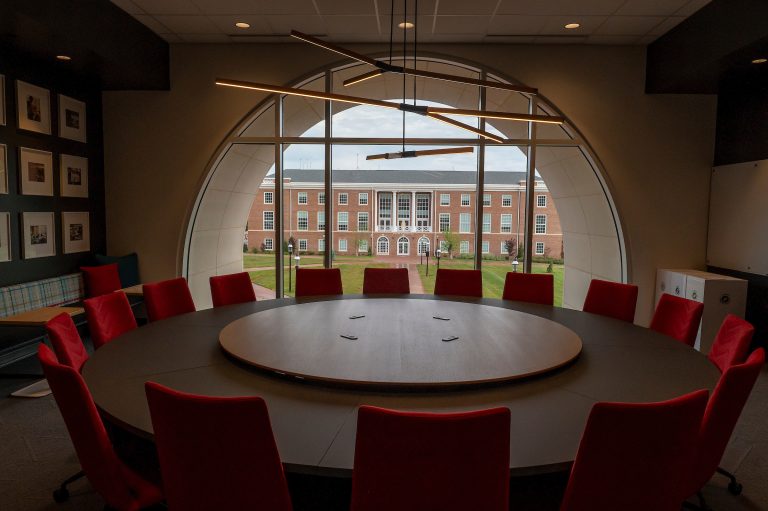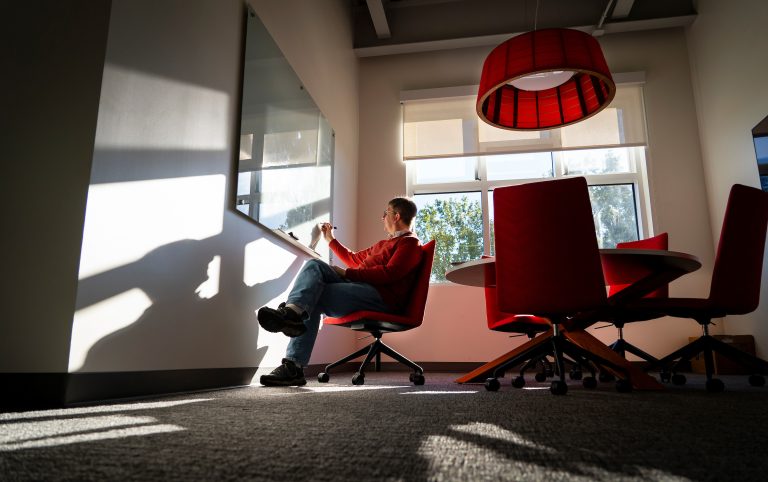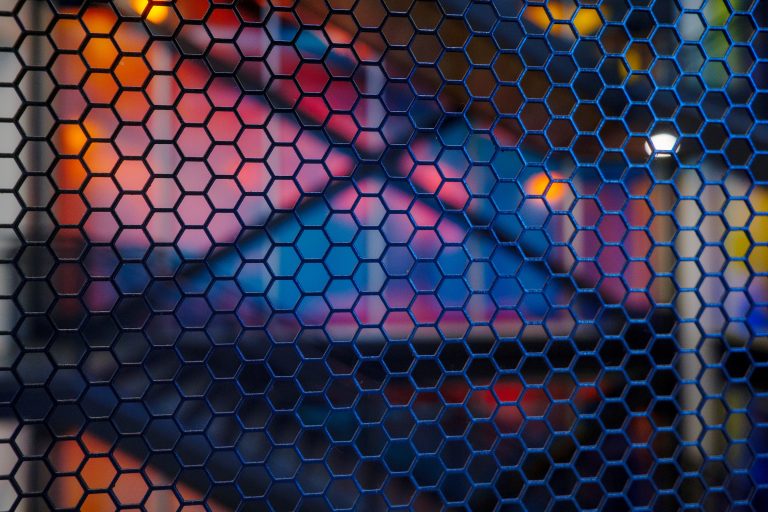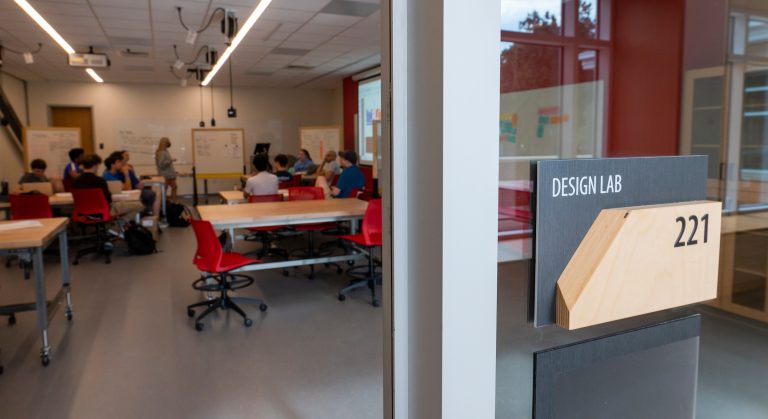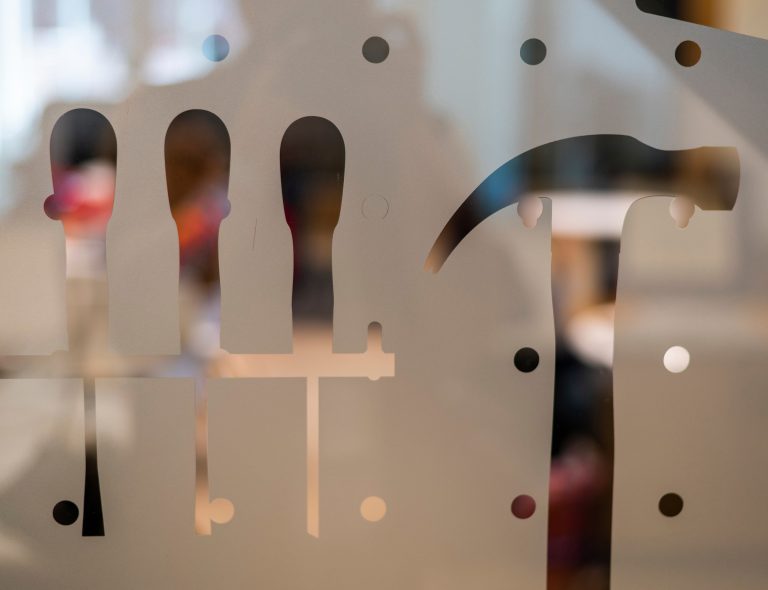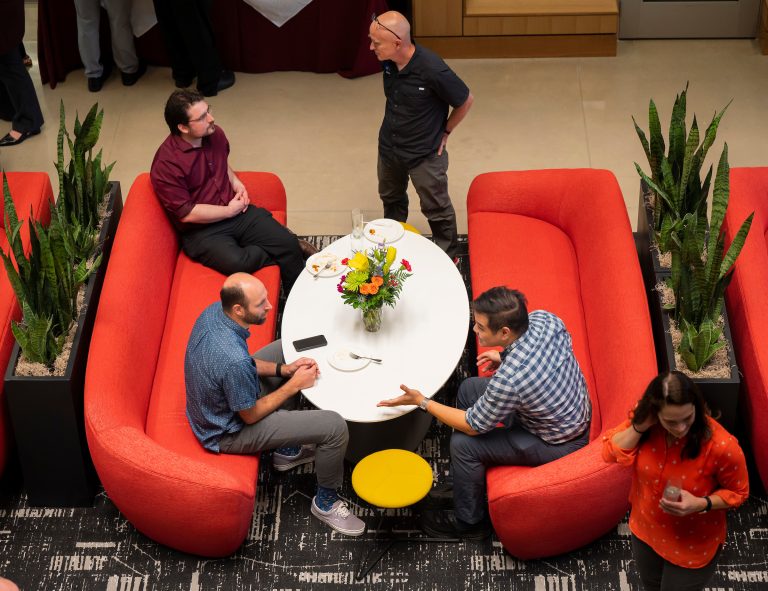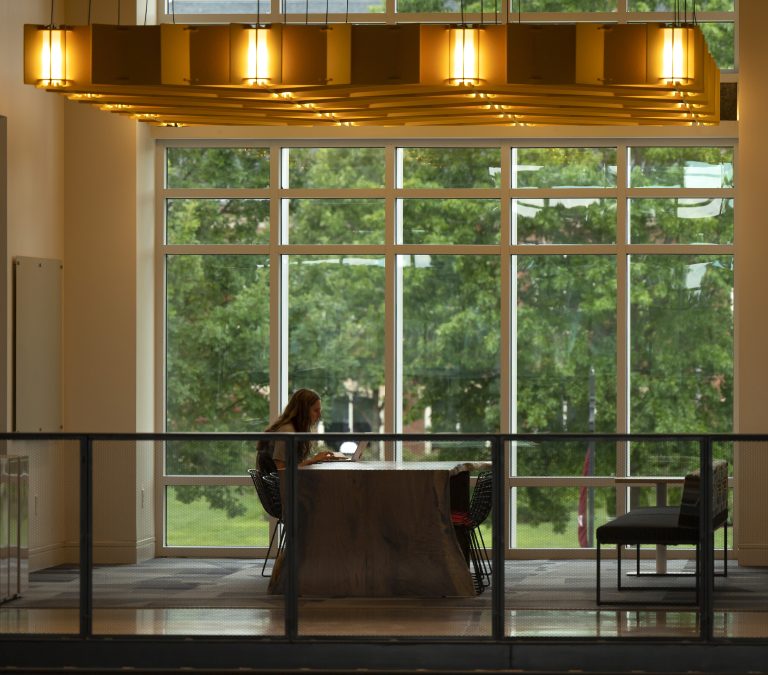With a wide range of labs, classrooms and collaborative spaces, the Innovation Quad’s Founders Hall and Innovation Hall are centering multidisciplinary education and innovation in the heart of campus.
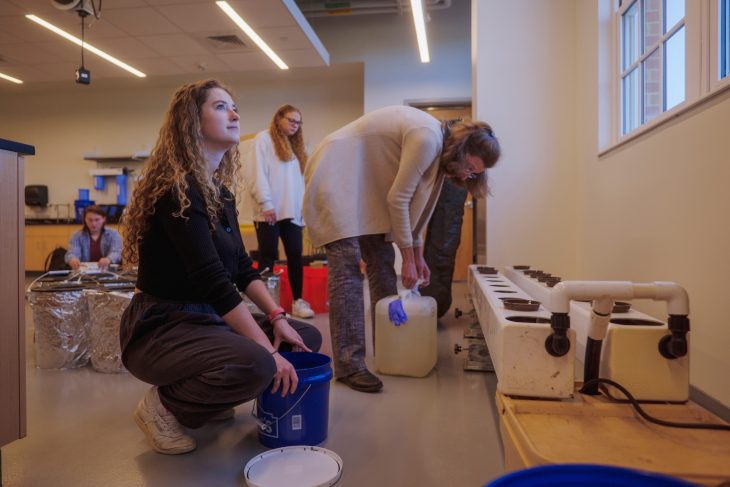
To the casual observer, the foil covered buckets, pipes and planters spread across the cement floor as you enter the Environmental Engineering Lab in Innovation Hall may seem out of place.
But for Lauren Hill ’24, they represent the first step in transforming urban stormwater retention ponds into community gardens. An Engineering Fellow, Hill is among the first cohort of Elon’s environmental engineers and excited to be part of the team that is exploring potential solutions for water quality, food insecurity and environmental justice through multiple lenses this academic year. That work is being supported by new facilities that part of the Innovation Quad, or IQ for short.
“There’s a buzz here. The kinds of conversations that come from bumping into someone from class or a professor happen all the time now,” says Hill, adding that the design of the two new buildings is enhancing collaboration, curiosity and original ideas. “As an undergraduate researcher, I can almost guarantee that at a large university or a big engineering school, I wouldn’t have had an entire lab space devoted to my project.”
The scale of this unique interdisciplinary research project — weaving together engineering, chemistry, biology and environmental science, as well as a community partner — is exactly the kind that the IQ and its spaces were designed for. “If we didn’t have that space and the equipment that we now have in the Innovation Quad, we wouldn’t be able to do this type of collaborative work,” says Scott Wolter ’85, chair of the Department of Engineering. “You need that real estate, and you need a lab like this dedicated to this kind of work. There’s no way we could have done this research before.”
Announced in 2020 as part of the Boldly Elon strategic plan, these two new buildings in the IQ — Innovation Hall and Founders Hall — opened in August, featuring 65,000 square feet of cutting-edge labs, workshops and creation spaces. Their location adjacent to the Dalton L. McMichael Sr. Science Center, Richard W. Sankey Hall and the Ernest A. Koury Sr. Business Center solidifies the connections between STEM and the sciences, entrepreneurship, sales, design thinking and analytics. Over time, the complex will include academic, residential, dining and other support facilities.
For President Connie Ledoux Book, the Innovation Quad is a prime example of how Elon is transforming academic vision into reality by creating a new nexus of creativity, collaboration and invention in the heart of campus. She is thankful for the many alumni, families and friends whose generosity helped make this project a reality, including Furman Moseley ’56 and his wife, Susan, whose lead gift made Founders Hall possible.
“Elon’s future is bright thanks to their dedicated support of the Innovation Quad and students who will lead the future,” Book says. “Over the years of growth at Elon, we have seen the tremendous impact of new facilities, so we know these two first buildings in the IQ will spur new levels of academic excellence and support growth in our engineering, science, technology and data majors. “More importantly, all students at Elon will have the opportunity to take classes there and get immersed in the formal and informal learning that will happen in these dynamic new spaces.”
Bringing Projects to Life
Founders Hall features state-of-the-art prototyping, machining and woodworking shops, virtual reality and mechatronics labs, and an entry-level workshop dedicated to the Senior Engineering Design Capstone course. Work being done in these spaces is highly visible to students, visitors and guests as they enter the building. Innovation Hall houses bioinstrumentation, material science, biomedical and environmental research laboratories. These cutting-edge spaces are where students and faculty across campus collaborate on research and deeply engage in problem solving and exploration. The building also serves as the home for the departments of physics and engineering. Dotted throughout both buildings are multiple spaces for students to work or study in groups.
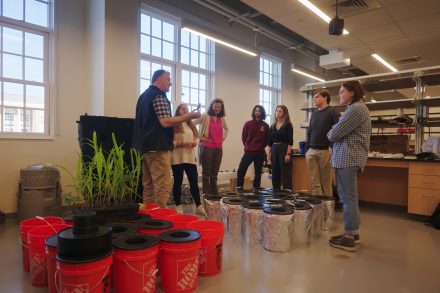
The groundbreaking junior-level Research Methods project taking shape in the new Environmental Engineering Lab began this fall with students constructing a hydroponic garden at the west end of the lab. The garden will sprout summer and winter crops — from corn and tomatoes to broccoli and kale — that will be transplanted to a constructed wetland platform in the Schar Center’s retention pond. Its concepts build on work by previous engineering students who designed water-contaminant sensors and established constructed wetlands in that pond. “As far as we can tell, this has never been done before,” says Professor of Biology and Environmental Studies Brant Touchette.
As the crops grow, Touchette will assist students in evaluating the health of the plants. Wolter and Associate Professor of Engineering Bethany Brinkman will oversee water quality testing in the pond using the student-designed sensors and instruments in the new lab. Then Associate Professor of Chemistry Justin Clar, whose expertise is in environmental chemistry, will mentor students as they test plants for the uptake of toxic heavy metals. One of Touchette’s connections, Daniel Cox of Klondike Agricultural Products, supplied the hydroponic equipment and know-how.
“Having these kinds of collaborative spaces available has already made a difference,” says Brinkman, an environmental engineer with expertise in water research. “Just having the space to complete huge projects with multiple trials like this one and having the equipment we need to do the projects we’re interested in makes a big difference in the experiences we can offer students.”
The technology available in some of the labs is also positioning Elon students and faculty for advanced research with colleagues from nearby institutions, opening the doors for new possibilities. Even the way classrooms are configured depending on their purpose makes collaboration seamless. For Associate Professor of Engineering Sirena Hargrove-Leak, who helped implement the human-centered courses and experiential learning that have become hallmarks of Elon’s engineering program, that’s one of the things she is most excited about.
Just having the space to complete huge projects with multiple trials like this one and having the equipment we need to do the projects we’re interested in makes a big difference in the experiences we can offer students.
She points to the classroom she uses for her Engineering Design for Service class, where sophomore students partner with students in the School of Health Sciences’ Department of Physical Therapy Education to design products that meet their clients’ specific needs.
Before Founders Hall opened, students would pack up their work at the end of each class and haul it to a nearby storage area to be kept in between classes. Now they can do their work, document it and leave it in place to be picked up when they return. “It just creates a nice space for that continuum of thought and process,” Hargrove-Leak says. “I feel sheer joy for the students who at last have the space, the facilities and the equipment to do engineering design the way it’s supposed to be done. They will also be able to test their creations in a more robust way. This facility is going to be life-changing for them.”
An Upward Trajectory
The opening of the IQ is part of a comprehensive plan to solidify engineering at Elon. On Aug. 1, after years of strategic growth in programming, enrollment and scope, Elon officially established the Department of Engineering. By mid-August, the Engineering Accreditation Commission of ABET notified the university that Elon’s four-year Bachelor of Science in Engineering program had earned accreditation. ABET accreditation assures that programs meet standards to produce graduates ready to enter critical technical fields that are leading the way in innovation and emerging technologies and anticipating the welfare and safety needs of the public. The accreditation extends retroactively to Oct. 1, 2019.
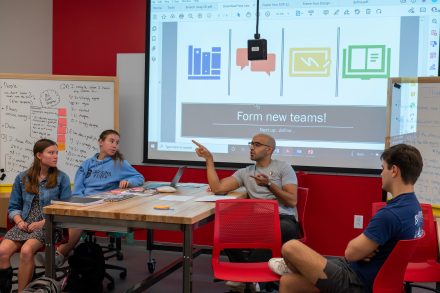
“We want to be a nationally recognized small engineering school. Our goal is to graduate around 100 students in each class with a solid academic foundation and strong engineering skills,” Wolter says. “We anticipate that enrollment will continue to grow in the near future to meet this target. With the excitement of the new learning spaces and spaces dedicated to collaboration, our program is poised to provide the type of innovative engineering education to meet the challenges of the 21st century.”
Leading much of the work that culminated in the program’s accreditation was Hargrove-Leak. She joined Elon in 2004 as the program’s second faculty member with Associate Professor Emeritus Rich D’Amato and has seen much of its evolution. Standing inside Founders Hall just months after it opened, knowing the program is now accredited and part of a new engineering department, she feels full. “I can remember one day coming across the street from the library and looking up at this building that was almost complete,” she says. “I was really overcome with emotion because I thought back to my first days on this campus and I said to myself, ‘I never could have imagined that little old me could be part of something that is making such a lasting impact on this place.’”
While the pandemic delayed the accreditation process for a year, in the end, the timing was fortuitous. “I could not have imagined how special a moment August 2022 would be,” Hargrove-Leak says. “The accreditation means so much because it is an external evaluation of the work that we lot of thought into the curriculum and the facilities and it’s now publicly acknowledged. And that is a win for our students.”
Hargrove-Leak is also excited about new possibilities to collaborate with colleagues around campus and beyond in the new facilities. “I am really passionate about helping to cultivate the next generation of engineers,” she says. “When you come into [Founders Hall] you notice at the front that there are two garage doors. That is an opportunity for us to literally open it up to the community.
“One of my dreams is, now that we have this beautiful courtyard, to host young people on our campus to experience engineering. I can just picture it in my head, lots of picnic tables out front and then opportunities to work on projects outside and inside, and just flow back and forth.”
The future of innovation is interdisciplinary. It is essential to draw on the expertise of specific disciplines to create solutions to multidimensional problems.
This fall, the department began offering an environmental engineering concentration, which complements the existing biomedical and computing concentrations in the Bachelor of Science in Engineering degree. Work is underway for a mechanical track, and the department also established the engineering design minor. Catering to nonmajors, it provides foundational engineering skills necessary to apply engineering design to problem solving in non-engineering fields and effectively collaborate with engineers.
To make room for the growth to come in the sciences, Elon is extensively renovating McMichael Science Center’s laboratories, classrooms and meeting spaces to advance studies in the natural sciences. The first phase of those renovations was completed in August. A second phase is planned for summer 2023.
Gabie Smith, dean of Elon College, the College of Arts and Sciences, says other interdisciplinary projects already occurring — collaborations between engineering, exercise science, chemistry and the School of Health Sciences — bear out the vision behind the Innovation Quad and its future. Founders Hall, Innovation Hall and future IQ spaces will incubate dynamic new ways for faculty and students in all disciplines to share knowledge and approach complex challenges.
“The Innovation Quad will enrich our students’ opportunities for unique pathways of study. The future of innovation is interdisciplinary. It is essential to draw on the expertise of specific disciplines to create solutions to multidimensional problems,” she says. “It is incredibly exciting to work with faculty, students and staff to test our ideas and create workable solutions in ways no one has tried before.”
Inside Innovation Hall
Bioinstrumentation Lab
This lab deepens courses and research led by Professor of Physics Ben Evans, particularly in biophysics and exploring microscale processes essential to life, and by Assistant Professor of Engineering Richard Blackmon, for the Bioinstrumentation and Imaging course examining the physical principles underlying diagnostic medical systems. Three darkrooms on the side of the building will house lasers for greater research capability.
Worm Culture Lab
Equipped with a biosafety cabinet and sink, Associate Professor Scott Wolter ideated this space based on his research into technologies for a waterless toilet that is funded by the Bill & Melinda Gates Foundation. Working with Elon students, Wolter’s lab has focused on finding a cost-effective and sustainable solution for sanitizing wastewater in regions that otherwise do not have access to clean water and food. That research involves cultivating benign bacteria and worms to emulate dangerous and parasitic organisms that threaten life in the developing world.
Biomedical and Environmental Labs
Associate Professor Scott Wolter and his students will conduct research here involving technologies including carbon nanotubes and vacuum chambers. Additionally, Associate Professor Bethany Brinkman and Assistant Professor Will Pluer will use this space for environmental engineering courses involving water and water quality research, with those courses now offered through Elon’s environmental engineering concentration.
Inside Founders Hall
Founders Hall was made possible following a naming gift from Elon alumnus Furman Moseley ’56 and his wife, Susan, who are among the university’s most generous donors. The two-story, 20,000-square-foot building is designed to enable engineering students and faculty to transform bold ideas into prototypes. It includes multiple laboratories, such as those for design, advanced prototyping, astrophysics, prefabrication, mechatronics and virtual reality.
Hunt Atrium
The two-story grand atrium in the core of Founders Hall features open collaboration spaces and assembly areas, tiered bench seating and meeting space for group events. Its layout supports events such as guest speakers and receptions. The space was made possible through the support of Elon Trustee Vicky Hunt and her husband, Sam.
Engineering Design Lab
This large workspace with moveable tables and ample storage offers students in the Senior Engineering Design Capstone course room to design and prototype various projects.
Advanced Prototype Lab
Students working to prototype electronic projects will use this space, which is equipped with a large range of electronic tools and equipment including an advanced 3D printer.
Engineering Prototype Lab
With two distinct spaces, this lab offers students the opportunity to complete advanced prototypes using a range of materials. It includes a traditional manufacturing space with state-of-the-art machining equipment and a woodworking shop. There is also an open space ideal for larger projects including composites work using concrete molds, carbon fiber, Kevlar and fiberglass layups.
Virtual Reality Lab
This lab offers space for courses to come alive and the ability to research topics in previously unexplored ways as the technology advances. Like other IQ spaces, the VR Lab is open to all departments and disciplines where students will benefit from experiencing course subjects in 3D.
Mechatronics Lab
This lab hosts courses previously taught in the Duke Robotics Lab, such as Circuits, Robotics, Signals & Systems, Microelectronics and Digital Systems. Equipment in the lab includes electronic waveform generators, oscilloscopes and robotics kits.



